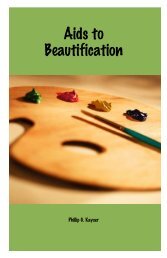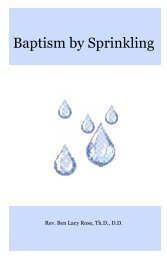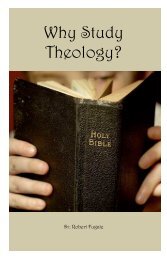"Has God Indeed Said?" - Biblical Blueprints
"Has God Indeed Said?" - Biblical Blueprints
"Has God Indeed Said?" - Biblical Blueprints
You also want an ePaper? Increase the reach of your titles
YUMPU automatically turns print PDFs into web optimized ePapers that Google loves.
26 • <strong>Has</strong> <strong>God</strong> <strong>Indeed</strong> <strong>Said</strong>?<br />
The Old Testament in Hebrew ... and the New Testament in<br />
Greek ... being immediately inspired by <strong>God</strong>, and by His<br />
singular care and providence kept pure in all ages, are<br />
therefore authentic; so as in all controversies of religion, the<br />
Church is finally to appeal unto them. 36<br />
What does the church appeal to according to our Confession?<br />
Not to some theoretical autograph that we can never find and do<br />
not know about. An unpreserved text does the church no good.<br />
Rather the Reformers insisted that we are to appeal to the<br />
manuscripts that have been kept pure in every age. The London<br />
Confession of Faith (1689), the Philadelphia Confession (1742),<br />
and the Savoy Declaration all affirm the same statement. The<br />
following quote from the Helvetic Consensus Formula (1675)<br />
shows that the Continental church taught the same:<br />
<strong>God</strong>, the Supreme Judge, not only took care to have His<br />
word, which is the "power of <strong>God</strong> unto salvation to every<br />
one that believeth" (Rom. 1:16), committed to writing by<br />
Moses, the Prophets, and the Apostles, but has also watched<br />
and cherished it with paternal care ever since it was written<br />
up to the present time, so that it could not be corrupted by<br />
craft of Satan or fraud of man. Therefore the Church justly<br />
ascribes it to His singular grace and goodness that she has,<br />
and will have to the end of the world, a "sure word of<br />
prophecy" and "Holy Scriptures" (2Tim. 3:15), from which,<br />
though heaven and earth perish, "one jot or one tittle shall in<br />
no wise pass" (Matt. 5:18). 37<br />
These and similar quotes make it clear that the Reformers selfconsciously<br />
committed themselves to the self-referential<br />
statements of Scripture. "What saith the Scriptures?" was their<br />
cry. Thus on the subject of textual criticism they unashamedly<br />
began with a certain set of presuppositions from the Bible. All<br />
men approach everything they do with a set of presuppositions,<br />
but not all are self-consciously aware of what those<br />
36 Westminster Confession of Faith, I:VII<br />
37 John H. Leith, ed., Creeds of the Churches (Richmond: John Knox Pres,<br />
revised edition, 1973), pp. 309, 310.






